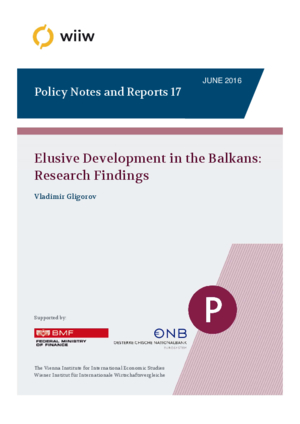Elusive Development in the Balkans: Research Findings
Vladimir Gligorov
wiiw Policy Note/Policy Report No. 17, June 2016
33 pages including 6 Tables and 11 Figures
Summary
Research findings of the latest round of the wiiw-GDN project on development in the Balkans are surveyed. Historical and structural deficiencies of development in the Balkan countries are discussed in detail with emphasis of the role of investment, integration, and structural and policy deficiencies. These structural features have led to policy challenges in particular after the crisis of 2008-2009. Which are:
- investment- and export-led growth, which implies slower growth of consumption than national savings;
- slow growth of wages and incomes over the period of structural adjustment and for reasons of prevention of real exchange rate appreciation; and
- free access to foreign markets due to slower recovery of domestic demand.
With the policy framework biased towards rigidity, and having in mind the needed structural adjustment, development policies that are compatible with them are:
- infrastructure, physical and institutional, investments supported by the EU and regionally;
- trade integration – regional, European, and within the World Trade Organisation;
- financial and entrepreneurial cooperation within the manufacturing networks in the EU primarily;
- sustainable macroeconomic policies especially when it comes to external balances.
A list of studies and of the relevant literature is included.
Reference to wiiw databases: wiiw Annual Database
Keywords: development, Balkans, infrastructure, crisis, integration, state failure, investment, consumption
JEL classification: N14, N74, O14, O18, O20, P27, R11, R41
Countries covered: Albania, Balkan States, Bosnia and Herzegovina, Bulgaria, Croatia, Kosovo, North Macedonia, Montenegro, Romania, Serbia, Slovenia
Research Areas: Macroeconomic Analysis and Policy, Labour, Migration and Income Distribution, Regional Development
